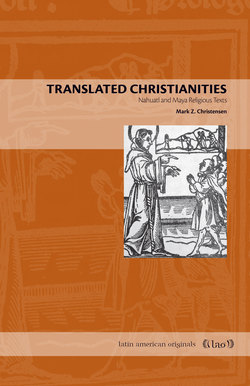Читать книгу Translated Christianities - Mark Z. Christensen - Страница 10
На сайте Литреса книга снята с продажи.
ОглавлениеACKNOWLEDGMENTS
This book is the product of a variety of other research projects. Those scholars who spend hours and hours translating texts know too well the disappointment of having to omit the translations from the final project due to word count limits or other editorial decisions. I myself had collected a variety of translations from Nahuatl and Maya religious texts that I never thought would see the light of day but that I frequently made copies of and distributed to my students in an effort to provide examples of the texts themselves. Matthew Restall first suggested that I work the translations into a book for the Latin American Originals series, and I am extremely grateful for his encouragement, without which these translations would still be computer files or, in other cases, untranslated manuscripts. Ellie Goodman, the executive editor of the Penn State University Press, has also provided valuable guidance along the way.
The translations in this book benefited from the advice and critique of others more expert than me. First and foremost, James Lockhart has generously provided me with his assistance, suggestions, and support. He is a valued mentor, and his aid with the Nahuatl translations proved invaluable to this project; I am profoundly grateful. Matthew Restall also deserves my sincerest thanks for his input not only on the Maya texts but on the book in general. He was always willing to read a chapter (or two or three) and offer helpful advice. I value his friendship. I also presented select translations at the 2011 and 2012 Northeastern Group of Nahuatl Studies Conference at Yale, where they benefited from the collective insight, expertise, and enthusiasm of those scholars attending. Stafford Poole also deserves thanks for his help with translating the Latin passages, as does Louise Burkhart for her insights into Nahuatl religious vocabulary, and Fr. Roger Corriveau for his assistance with all things Catholic. In the end, I assume sole responsibility for the translations and any errors or misrepresentations.
Many have encouraged this project along the way, and I am grateful for every kind word of support. My particular thanks goes to Victoria Bricker, Todd Christensen, John F. Chuchiak, Michael Francis, Rebecca Horn, Ben Leeming, Martin Nesvig, Caterina Pizzigoni, Stafford Poole, A. Gregg Roeber, Susan Schroeder, John F. Schwaller, John Sullivan, and Jon Truitt. In many ways, the research and scholarship of others have paved the way to this book. The list is too large to include here, but all those who have endeavored to expand our understanding of colonial Latin America through native-language texts have my gratitude.
I would also like to thank those who facilitated my discovery and acquisition of many of the texts appearing in this book: Msgr. José Camargo Sosa at the Archivo Histórico del Arzobispado de Yucatán, Elizabeth Gano Sørenssen at the Schøyen Collection, Hortensia Calvo at the Latin American Library at Tulane, and the staff at both the Tozzer Library at Harvard University and the Department of Rare Books and Special Collections at Princeton University Library. The John Carter Brown Library also deserves praise for its wonderful collection of digitized Nahuatl texts made available online, as does the Department of History at Assumption College for its financial support. Finally, I am indebted to Gretchen Whalen for her pioneering transcription and translation of the Morley Manuscript, which brought to light a valuable piece of colonial Maya literature.
Academia can drown you if you are not careful, so I am most grateful for my personal lifeguards: my wife, Natalie, and three children, Macy, Cade, and Carter. Thank you for holding my head above water by keeping my perspectives and priorities focused on those things in life that matter most.
